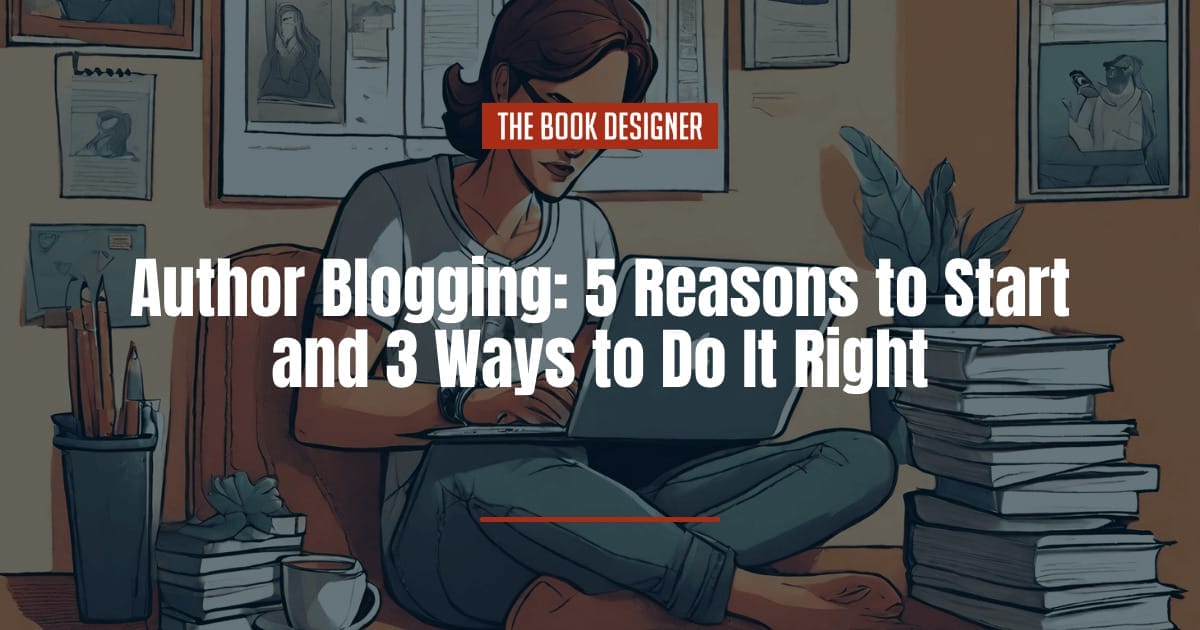All authors, whether traditionally published or self-published, should have an author platform. Author blogging is considered an important component of that platform. Today, Brandon Cornett gives us some insight about the “whys” and “hows” of author blogging.
Are you a fiction or nonfiction writer trying to expand your readership? If so, you should seriously consider blogging. And if you currently have a blog that’s languishing in a state of neglect, now is the time to revisit it.
I speak from experience. As a longtime marketing consultant, I’ve taught my clients how to use author blogging to attract customers and grow their businesses. As a novelist, I use those same skills to attract readers to my own site.
But let’s focus on you. Why should you start a blog? And how can you get the most out of it? Here is some advice based on 15+ years in the “trenches.”
Here’s everything you need to know to get started with an author blog:
5 Reasons Why Authors Should Be Blogging
Writers of all stripes can benefit from a strategic author blogging program. It helps you grow your audience by bringing like-minded readers to your website, exposing them to your books. But that only scratches the surface. Here are five good reasons why authors should be blogging.
1. You Have the Required Skills Already
As a writer, you already possess the most important skill required to start and sustain a blog. You know how to write! You know how to:
- introduce topics
- bolster them with supporting information
- convey a clear message
That’s 95% of blogging right there.
2. It’s a Low-Cost Marketing Method
Website hosting today is dirt cheap, mainly due to the fierce competition among hosting companies. You can host your own author website (and blog) for about $10 per month. Less than that, in some cases. Your annual website domain renewal will run you about $10 per year.
That’s a small price to pay for something that could become your most effective marketing tool down the road. For most bloggers, the biggest investment comes in the form of time. It takes time to create high-quality content for a blog. But you’re ahead of the curve on that score, because you already know how to write.
3. Author Blogging Can Reinforce Your Other Promotional Efforts
Do you publish an email newsletter? Do you use social media to connect with readers and grow your audience? If so, your blog can connect with these efforts in mutually reinforcing ways.
You could place a newsletter sign-up box in a prominent location on your blog. You could add social media buttons to the blog, allowing people to click over to your Twitter or Facebook pages. The reverse is true as well. You could use social media to steer people over to your blog, and to share the quality content you worked so hard on.
4. Your Blog Never Takes a Day off (Even When You Do)
One of the great things about having a content-rich website is that it’s always “on.” It never takes a day off. It draws visitors 24/7, even when you take time off for vacation.
It takes time to work up to that level. But don’t get discouraged. With a consistent effort, you’ll eventually be enjoying a steady flow of visitors, many of whom will be interested in your work.
5. Author Blogging Has Unlimited Potential
There’s no limit to how far you can go with an author blogging campaign. Not happy with your current level of website traffic? Just blog more often. Publish high-quality content on a regular basis. Apply some of the fundamentals of search engine optimization (below) and watch your traffic grow.
Imagine you publish a blog post that eventually attracts 30 – 40 people per day. Great! Now rinse and repeat. Do that a dozen more times, and you’ve got hundreds of visitors per day. The sky’s the limit.
Top Three Tips for Better Author Blogging
So, you’re convinced blogging is worthwhile. What next? What can you do to get the most out of it, now and into the future? Here are some things I’ve learned from a decade and a half of blogging.
1. Blog about Your Genre or Niche
This is something of a no-brainer, but we need to address it anyway. If you want to attract the kinds of readers who will buy your books, you should be blogging about those topics. You can veer off course once in a while for some “miscellaneous” blog posts. Have at it! But the bulk of your posts should be related to the genre or topic you write about. This will help you boost your book sales over time.
I write speculative fiction, primarily. So I often blog about the horror genre, science fiction, and the like. The people who find my articles via the search engines are also into speculative fiction. So they’re also inclined to read my work.
This works for nonfiction, as well. An author who writes a book about artificial intelligence could benefit by blogging about that subject from all angles. She could write about the latest research on AI, predictions for the future, challenges and benefits, etc.
In either scenario, fiction or nonfiction, you’re basically funneling your passion and knowledge into website content that will attract like-minded readers.
2. Blog Consistently, at Least Once per Week
We’ve talked about the math of author blogging already. The more you publish, the more readers you’ll attract. And that can translate into book sales, newsletter subscriptions, Twitter follows, etc.
But you have to stick with it. Consistency is critical. Create a blogging schedule. It’s not your top priority; working on your next book gets that spot. But blogging runs a close second, in terms of importance. So keep at it. Try to publish one new blog post per week. Later, when you start seeing results, you can increase the frequency.
3. Apply Some SEO Basics
SEO, as your probably know, stands for “search engine optimization.” These are actions you can take to improve your website’s visibility (and ranking) within the major search engines.
Much of it comes down to two things: content and links. You need to have the right content to attract the right audience. We’ve covered that. It also helps to attract links from other bloggers and internet publishers. That’s the bulk of SEO right there.
There are no shortcuts here. Creating quality blog content takes time. Attracting links from other sites also takes time. You have to earn them, by publishing “link-worthy” content. But it will happen eventually.
In the meantime, there are some other steps you can take to improve your search engine visibility. Here are five of them:
- Hyperlink between relevant pages on your site, whenever it makes sense to do so. This is good for readers, because it gives them access to more of your content. It also helps search engines find all of your important pages.
- As it states in Google’s search engine guide for developers: “Ensure that all pages on the site can be reached by a link from another findable page.”
- Place your most important keywords within the title of each blog post. This helps search engines understand what the page is about, increasing the chance they’ll display your page within relevant search results.
- Consider using an XML sitemap to give search engines “crawlers” a little extra help in finding all of your pages. (Pro tip: If you use WordPress for your website’s CMS, you can do this quickly and easily with a sitemap “plugin.”)
- Create “meaty” and comprehensive blog posts that fully address the topic at hand.
You don’t have to become an SEO guru. You just want to be mindful of how search engines work and what you can do to aid them in their mission.
Happy author blogging!

Brandon Cornett is freelance blogger and marketing consultant with over 15 years’ experience. He also writes fiction and his debut novel, Purgatory, is available now. You can connect with the author or view his own blog by visiting https://www.cornettfiction.com.




